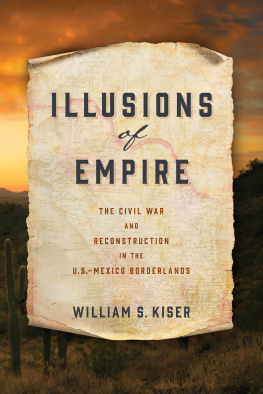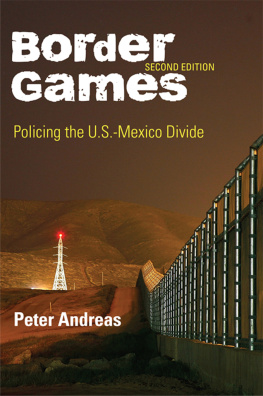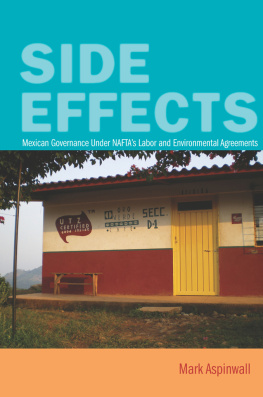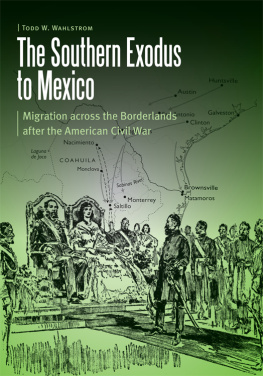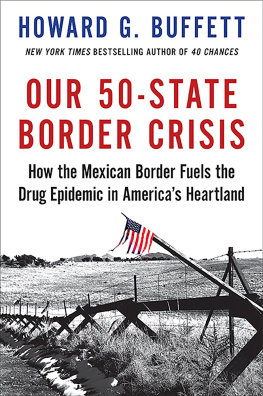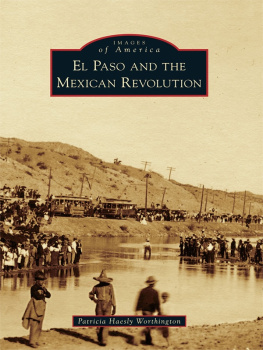2014 by Vanderbilt University Press
Nashville, Tennessee 37235
All rights reserved
First printing 2014
This book is printed on acid-free paper.
Manufactured in the United States of America
Library of Congress Cataloging-in-Publication Data on file
LC control number 2013007846
LC classification number HC137.M46S55 2013
Dewey class number 388.972'107dc23
ISBN 978-0-8265-1959-7 (cloth)
ISBN 978-0-8265-1961-0 (ebook)
Acknowledgments
It seems a bit clich to say, There are too many people to thank for their support and advice in the writing of this book, but there is a reason for clichs. There are too many people and institutions to thank. I apologize in advance if I have overlooked any names, institutional or otherwise.
First, I must thank the many people of Matamoros who shared with me their time, compassion and, occasionally, interest. I am sorry to have reduced all of them to border activists in this text, when they all were and are so much more than that. Were my writing skills better, or my anthropological imagination more expanded, I might have been able to paint their lives with a more nuanced palette. Nevertheless, this book would not have been possible had certain people not taken me into their fold and allowed me, generously, to know something about their lives. At the time that I conducted the fieldwork and in the immediate aftermath of data review and writing, I suffered the not atypical anthropological hubris of thinking that I had done some goodor at least that I had not caused any damagein the course of my fieldwork. Now, with years of ethnographic data perusal and writing under my belt, as well as a lot of experience teaching anthropology, I am not as convinced of that. When I went to conduct my fieldwork, I knew that I would one day leave the fieldwork site, just as assuredly as the fact that I had gone there in the first place. As much as I always tried to be clear about that, Im not sure it was always understood. In any event, the anthropological footprint is evident in this work and I have not tried to sweep it away.
I have many faculty at the Department of Cultural Anthropology at the New School for Social Research to thank for the excellent and rigorous anthropological training I received: Bill Roseberry, Kate Crehan, Harry West, and Steve Caton, among others. Most notable, of course, were those who would eventually become the members of my dissertation committee: Deborah Poole, Rayna Rapp, Adriana Petryna, and Eli Zaretsky. While life moves on and one loses touch except for the occasional conference encounter, I am deeply indebted to these people for having had faith in the importance of this study, particularly at a time when the border had fallen out of anthropological fashion. Debbie Poole has remained a wonderful source of both support and inspiration through the years, and faithfully answers the annoying reference letter requests I still sometimes send. I will always be indebted to her for the faith that she has shown in my intelligence and promise, even if I feel as though I have lived up to a fraction of what she had hoped for. Adriana Petryna ripped out the page where I describe Rosalia, Sierra Club representative, and me standing at the banks of the Dren Cinco de Marzo and said, Start your book here! I did not understand that admonition because I was always more comfortable with theory. After wrestling with the book and rearranging it for too long, I finally started the book at the point she recommended. It flowed much more smoothly after that. Other first time book authors and PhD students should take note! Rayna Rapp is Rayna Rapp... larger than life and forever an inspiration. I teach my methods classes nowadays partly with excerpts from her bookTesting Women, Testing the Fetusand I enjoy having the chance to visit with her there. I credit all of these people with most of what I know about anthropology, and I am proud of the tradition that we represent.
However, I would be remiss in not mentioning a longstanding intellectual mentor and, now, good friend, Arturo Escobar. Arturo introduced me to anthropology as an undergraduate and, to continue with clichs, made me fall in love with it. He revolutionized the way that anthropologists and others think about development; he is a lovely person, to boot. I hope that this book is some small contribution to rethinking development, even if it approaches it in an oblique fashion. Because of the setting, development was tucked into NAFTA and the side accords as ancillary justification. I likely would not be where I am today were it not for the faith that Arturo invested in me early on, and I will forever be indebted. Thank you, Arturo.
I will always be grateful that my first book was published with Vanderbilt University Press, where I have found the staff to be consummate professionals, as well as cheerful, supportive, and patient. The people with whom I have had the most contact deserve special mention. My acquisitions editor, Eli Bortz, expressed initial enthusiasm for this project and oversaw the review process with extreme judiciousness and insight. The managing editor, Joell Smith-Borne, has an extraordinary eye for detail, is the consummate professional, and was an utter delight to work with. I will always be grateful to the copyeditor, Jennifer Kurtz of Abshier House, for her ability to review and correct a manuscript with a fine-toothed comb and for her astute editorial suggestions that improved the overall quality of this book.
Casey Walsh conducted fieldwork in Matamoros only shortly before me. When I would listen, he tried to offer advice, and he always offered support. He is one of the most professional and generous academics I know and was always ready to lend a helping hand.
Many institutions and foundations have found this research interesting and supportable at different times. These include the Social Science Research Foundation (International Dissertation Research Fellowship), the Center for US-Mexican Studies, University of California, San Diego (Research Fellow), and the Institute for Conflict Analysis and Resolution (Postdoctoral Fellowship). I am grateful for all of this support that allowed me to simply research and write, without teaching or committee obligations.
I met many people along the way, at these and other institutions, that deserve special mention. At the Center for US-Mexico Studies, I had the luxury of intellectually co-habiting with a number of other Mexicanist or Mexican scholars, as well as others. Long term friendships that were formed during that year include those with Deborah and Patrick Boehm, Maria Tapias, and Xavier Escandell. I am happy to report that two new lives also came into being during that year, and I will always remember the joy that little Ava brought to our writing circles.
At the Institute for Conflict Analysis and Resolution, I encountered quite a robust group of intellectuals for which I was hardly a match. I learned a lot; everyone could learn a lot from this institution. I was given unconditional, patient, and generous support for my research by all and also learned from that group of scholars in ways that I am still counting. Certain names must be singled out, not just for their intelligence and support, but also for the humor they brought to the workplace every day: Kevin Avruch, Marc Gopin, Susan Hirsch, Terrence Lyons, Agnieszka Pacynska, Dan Robotham, Rich Rubenstein, and Wallace Warfield. While all were supportive (even when they did not need to be), I am especially grateful for Agnieszka Pacynskas similar interests in dual transitions, Marc Gopins suddenly alert interest in legal pluralism, and the little that Kevin Avruch and Susan Hirsh were able to teach me about conflict analysis through an anthropological lens (the steep learning curve was on my end, not theirs). I am especially grateful for the friendship that Agnieszka and I have been able to maintain through the years, and have been happy to watch her and Terrences lovely Nell grow up, if from afar.


